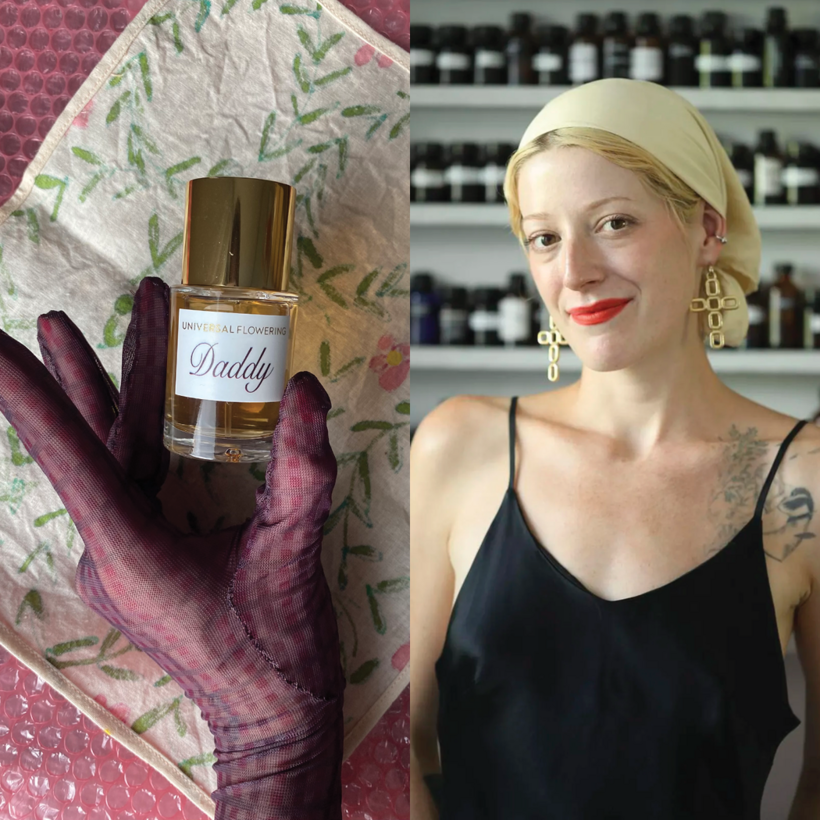As much as the world sterilizes, optimizes, or flattens the many joys in life, fragrance has stayed remarkably intact. It is one of the few things that threads us together with the natural world and human tradition, with many materials recognizable to what was used centuries past, from the burning incense of Ottoman mosques to the fragrant oils popular in the thermal baths of ancient Rome. Even now, perfume still hovers in the realm of the uncanny or sublime. Luca Turin, a biophysicist turned expert nose, called the study of smell as coming “face-to-face with the enduring strangeness of raw sensation.”
It’s this strangeness that the Toronto-based perfumer Courtney Rafuse, 32, relishes. In the years since it launched, in 2016, her brand, Universal Flowering, has gained a cult following. There’s something mysterious about a Universal Flowering scent that a paper test can’t capture.
If there is one trademark found in Rafuse’s fragrances, it’s that they transform over time, surprising (and delighting) a first-time wearer. What might initially be strong notes of sandalwood or neroli can later turn plasticky or vegetal. “That’s what I want them to be like,” Rafuse tells me. “I want them to shift throughout the day. I find it really romantic that it changes on your body, changes with the temperature.”
We are in Rafuse’s studio, in the back of an empty storefront in Toronto’s Queen West neighborhood. It is an unassuming, white-walled room where Rafuse (and her silken windhound, Cosey) spend most days, in the company of hundreds of vials of scent materials. The studio has a feeling of a makeshift laboratory.

I test a limited-edition perfume released for Valentine’s Day last year called Thorn. I tell Rafuse that it smells like something from childhood, but I can’t put my finger on it. She laughs and says, “Strawberry Shortcake’s face.”
Before officially starting Universal Flowering, Rafuse was working as a bartender and, before that, a stripper, funding what she called an “expensive hobby”—experimenting with raw materials and scents after never having found a perfume that suited her. At the start, she preferred an autodidactic approach, but there were perils to being the first and only tester. Once, after combining a fragrance mixture into unscented lotion, Rafuse says, “I gave myself the most insane contact dermatitis.” After this one hiccup, Rafuse poured over chemistry books and Material Safety Data Sheets. Today, the science of making her perfumes is second nature. “I still have a really romantic relationship with them,” she says, “even though I know everything about them and how they came to be.”
This month marks the three-year anniversary of her mainstay perfume, Daddy, and the two-year anniversary of another classic, Holy Hell. The former is a woodsy, “resinous” scent with notes of porcini and vetiver, while Rafuse’s vision for the latter was based around “melted acetate glasses on a hot dashboard.”
A few years may not seem very long for some, but for Universal Flowering it’s substantial. Rafuse releases small-batch collaborations and limited-edition scents a few times a year, which is better when the materials are harder to get in large quantities. Rafuse herself never sticks to wearing just one scent—she prefers to have a rotation that “acts as little costumes.”
I admit to her that I worried about getting too far into her perfumes for fear she’d eventually stop making a scent I’d made my signature. She tells me she’s sensitive to that view, but, on the other hand, “that’s the nature of perfume at its core—that ephemeral feeling that it can’t last forever.”
Marlowe Granados is a journalist and the author of the novel Happy Hour

